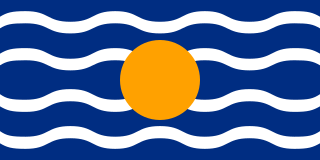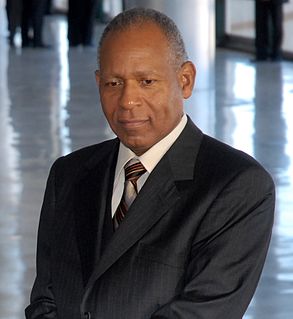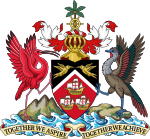The history of Trinidad and Tobago begins with the settlements of the islands by Amerindians, specifically the Island Carib and Arawak peoples. Both islands were visited by Christopher Columbus on his third voyage in 1498 and claimed in the name of Spain. Trinidad remained in Spanish hands until 1797, but it was largely settled by French colonists. Tobago changed hands between the British, French, Dutch, and Courlanders, but eventually ended up in British hands following the second Treaty of Paris (1814). In 1889 the two islands were incorporated into a single crown colony. Trinidad and Tobago obtained its independence from the British Empire in 1962 and became a republic in 1976.

The politics of Trinidad and Tobago function within the framework of a unitary state regulated by a parliamentary democracy modelled on that of the United Kingdom of Great Britain and Northern Ireland, from which the country gained its independence in 1962. Under the 1976 republican Constitution, the British monarch was replaced as head of state by a President chosen by an electoral college composed of the members of the bicameral Parliament, consisting of the Senate and the House of Representatives.

Eric Eustace Williams served as the first Prime Minister of Trinidad and Tobago. He served as prime minister from 1962 until his death in 1981. He was also a noted Caribbean historian.

The West Indies Federation, also known as the West Indies, the Federation of the West Indies or the West Indian Federation, was a short-lived political union that existed from 3 January 1958 to 31 May 1962. Various islands in the Caribbean that were colonies of the United Kingdom, including Trinidad and Tobago, Barbados, Jamaica, and those on the Leeward and Windward Islands, came together to form the Federation, with its capital in Port of Spain, Trinidad and Tobago. The expressed intention of the Federation was to create a political unit that would become independent from Britain as a single state—possibly similar to the Canadian Confederation, Australian Commonwealth, or Central African Federation; however, before that could happen, the Federation collapsed due to internal political conflicts over how the Federation itself would be governed or how it would viably function. The territories that would have become part of the Federation eventually became the nine contemporary sovereign states of Antigua and Barbuda, Barbados, Dominica, Grenada, Jamaica, Saint Kitts and Nevis, Saint Lucia, Saint Vincent and the Grenadines, and Trinidad and Tobago; with Anguilla, Montserrat, the Cayman Islands, and Turks and Caicos Islands becoming British overseas territories. British Guiana (Guyana) and British Honduras (Belize) held observer status within the West Indies Federation.

Patrick Augustus Mervyn Manning was a Trinidadian and Tobagonian politician who was the fourth Prime Minister of Trinidad and Tobago; his terms ran from 17 December 1991 to 9 November 1995 and from 24 December 2001 to 26 May 2010. He was also Political Leader of the People's National Movement (PNM) from 1987 to 2010. A geologist by training, Manning served as Member of Parliament for the San Fernando East constituency from 1971 until 2015 when he was replaced by Randall Mitchell and was the longest-serving member of the House of Representatives. He was the Leader of the Opposition from 1986 to 1990 and again from 1995 to 2001.

Arthur Napoleon Raymond Robinson, was the third President of Trinidad and Tobago, serving from 19 March 1997 to 17 March 2003. He was also Trinidad and Tobago's third Prime Minister, serving in that capacity from 18 December 1986 to 17 December 1991. He is recognized for his proposal that eventually led to the founding of the International Criminal Court.

The People's National Movement (PNM) is one of the two major political parties in Trinidad and Tobago. Founded in 1955 by Eric Williams, it won the 1956 General Elections and went on to hold power for an unbroken 30 years. After the death of Williams in 1981 George Chambers led the party. The party was defeated in the 1986 General Elections, losing 33–3 to the National Alliance for Reconstruction (NAR). Under the leadership of Patrick Manning, the party returned to power in 1991 following the 1990 attempted coup by the Jamaat al-Muslimeen, but lost power in 1995 to the United National Congress (UNC). The PNM lost again to the UNC in the 2000 General Elections, but a split in the UNC forced new elections in 2001. These elections resulted in an 18–18 tie between the PNM and the UNC, and President Arthur N. R. Robinson appointed Manning as Prime Minister. Manning was unable to elect a Speaker of the House of Representatives, but won an outright majority in new elections held in 2002 and again in 2007, before losing power in 2010. It returned to power in 2015 under their leader, Keith Rowley winning 23 of the 41 seats in the 2015 General Elections.
The Hon. George Michael Chambers ORTT was the second Prime Minister of Trinidad and Tobago. Born in Port of Spain, Chambers joined the People's National Movement (PNM) in 1956, and was elected to Parliament representing the St. Ann's East seat. He served as Assistant General Secretary of the PNM before becoming Parliamentary Secretary in the Ministry of Finance in 1966. From there he went on to serve twice as Minister of Finance. Chambers also served as Minister of Public Utilities, Housing, National Security, Education, Planning, Industry/Commerce and Agriculture.
CL Financial was the largest privately held conglomerate in Trinidad and Tobago and one of the largest privately held corporations in the entire Caribbean, before the company encountered a major liquidity crisis and subsequent bailout in 2009.

Winston Chandarbhan Dookeran is a Trinidadian politician and economist. He previously served as Political Leader of the Congress of the People. His term ended on 3 July 2011 when internal elections were held to select a political leader. At a press conference on 28 May 2011, Dookeran indicated that he would not be seeking re-election to the post. In the 24 May 2010 election, he successfully ran for Member of Parliament for the Tunapuna constituency.
Makandal Akhenation Daaga was a Trinidad and Tobago political activist and former revolutionary. He was the leader of the 1970 Black Power Revolution. During the unrest he was arrested and charged.

Basdeo Panday is a Trinidadian and Tobagonian lawyer, politician, trade unionist, economist, actor, and civil servant who served as Prime Minister of Trinidad and Tobago from 1995 to 2001. He was the first person of Indian descent along with being the first Hindu to hold the office of Prime Minister of Trinidad and Tobago. He was first elected to Parliament in 1976 as the Member for Couva North, Panday served as Leader of the Opposition five times between 1976 and 2010 and was a founding member of the United Labour Front (ULF), the National Alliance for Reconstruction (NAR), and the United National Congress (UNC). He served as leader of the ULF and UNC, and was President General of the All Trinidad Sugar and General Workers' Trade Union.
The National Archives of Trinidad and Tobago is the repository for permanent records and archives of the Government as well as historical records of national significance. The beginnings of the National Archives can be traced back to the aftermath of the disastrous fire of 1903 at the Red House, Port of Spain. This fire destroyed almost all the records in the Colony. Subsequently, provision was made in the construction of new Government buildings for fireproof strong vaults for the storage of records. Despite the provision of vaults, there was no policy or procedure for the acquisition and preservation of historical records.

Colm Imbert is the Minister of Finance and Member of Parliament for the constituency of Diego Martin North/East, which he has represented since December 1991.

Early general elections were held in Trinidad and Tobago on 7 October 2002, after People's National Movement leader Patrick Manning had failed to secure a majority in the hung parliament produced by the 2001 elections. This time the PNM was able to secure a majority, winning 20 of the 36 seats. Voter turnout was 69.6%.

The following is an alphabetical list of topics related to the Republic of Trinidad and Tobago.

The Ministry of Finance, abbreviated MOF, is a ministry of the Government of Somalia that is charged with the responsibility for government expenditure and revenue raising. The ministry's role is to develop economic policy and prepare the federal budget. The Ministry of Finance also oversees financial legislation and regulation. Each year in October, the Minister of Finance presents the Somali federal budget to the Parliament.
Anthony Isidore Smart is a Trinidadian politician and lawyer. He served as a Member of Parliament from December 1986 to November 1991 and Attorney General of Trinidad and Tobago from March 1989 to November 1991. He was also Political Leader of the National Alliance for Reconstruction (NAR) from April 2000 to November 2001. He currently serves as Chairman of the Board of Directors of the First Citizens Bank since June 17, 2014.
Pennelope Althea Beckles-Robinson is a Trinidad and Tobago attorney and politician who has been the country's Permanent Representative to the United Nations since August 2016.











